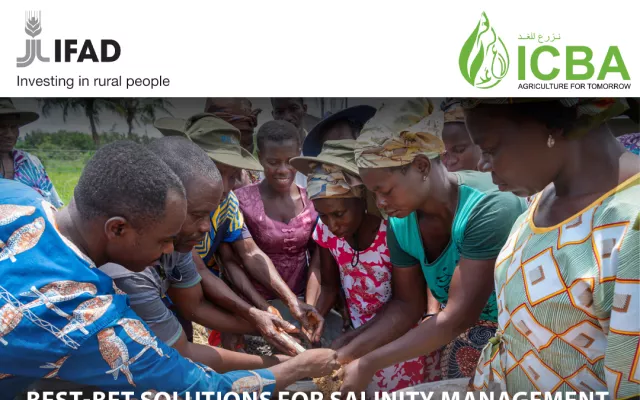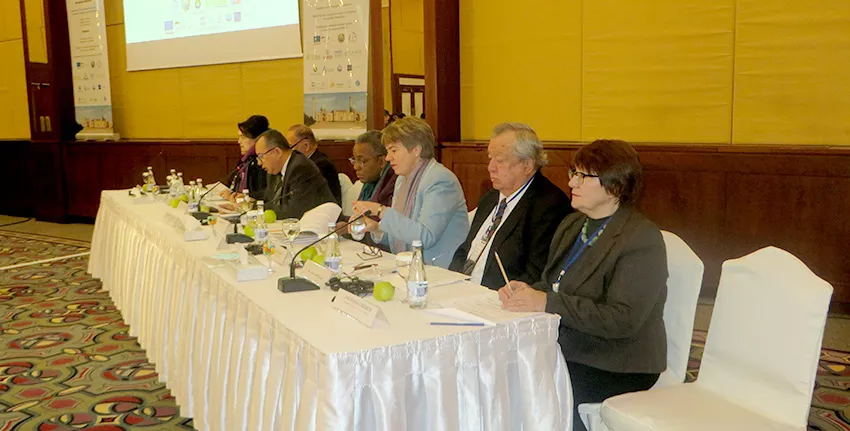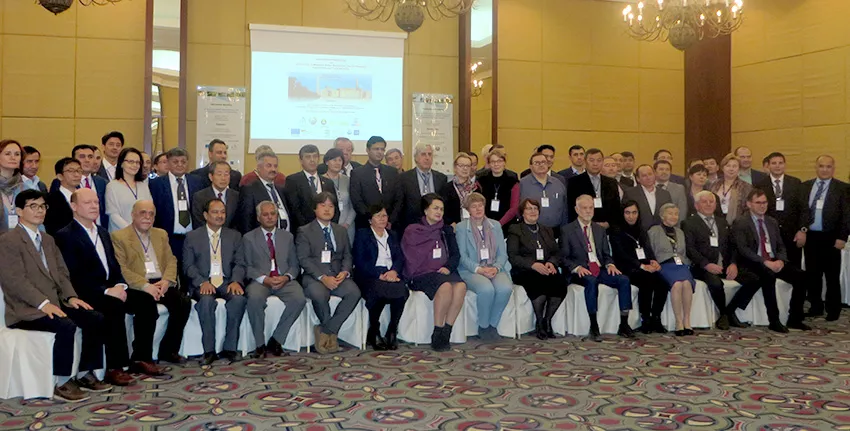International forum urges tapping marginal water for agriculture in Central Asia
13 December 2017
More than 75 delegates at an international workshop, including decision-makers, scientists, experts and professionals, from over 16 countries agreed today to work more closely to promote marginal water use for agriculture in Central Asia.
Participants issued a proposal to this effect at the three-day event which began in Tashkent on 11 December 2017. The document lays the foundations for a long-term coordinated initiative to scale up marginal water management for better food and water security in the region. It also puts forward recommendations for how marginal resources in general should be exploited for improved livelihoods in rural areas.
During his opening statement, Prof. Sirojiddin Mirzaev, Vice-President of the Academy of Sciences of Uzbekistan, noted: “I think that close cooperation between our national research and policy-making bodies and international organizations and financial institutions, which are represented here today, is very important for resolving these issues.”
Speaking at the event, Dr. Caroline Milow, Program Director of GIZ Uzbekistan, said: “The German government pays great attention to development cooperation in the water sector worldwide. GIZ is currently implementing programs that support cooperative water management in more than 15 transboundary river and lake basins across Africa, Asia and South-Eastern Europe.”
As the region is classified as arid and irrigated agriculture forms the backbone of Central Asian economies, fresh water is considered a critical resource for around 70 million people who live there. While demand is growing as a result of population growth, among other things, the freshwater reserves are running low. It is crucial, therefore, to consider non-conventional water resources for agricultural purposes, especially in marginal areas with vast amounts of saline and other types of water. Specifically, this applies to the countries that share the Aral Sea basin, where agriculture suffers from increasing soil and water salinity. Food security and livelihoods of local communities depend on how well this problem is tackled.
Although the problem is being dealt with by policies and other measures to improve water efficiency and productivity, that is using less water to grow more crops, the great potential of marginal water, including saline water and wastewater, remains largely untapped. Strategic investments in the exploitation of non-conventional water resources and wastewater management will generate considerable returns, both economically and environmentally. The problem will, thus, be turned into a major opportunity to boost food security and incomes of rural populations, while preserving ecosystems.
The proposal points out that as a first step, a paradigm shift is necessary in how non-conventional water resources, especially wastewater, are viewed. It also urges that, among other things, innovative technologies and best practices be widely introduced to ensure sustainable food production in marginal areas.
Commenting on the proposal, Dr. Ismahane Elouafi, Director General of the International Center for Biosaline Agriculture (ICBA), said: “For nearly a decade, our center has been working in Central Asia to test and introduce crops and technologies that make use of marginal water and soil resources. In fact, it is our center’s mission to help countries deal with challenges to agriculture in marginal environments. Therefore, we see this event as a great opportunity to combine efforts of various organizations to tackle problems that face vulnerable rural communities living around the Aral Sea basin.”
In particular the proposal notes that it is important to focus efforts of government, research, donor and other organizations on:
- Producing more nutritious food with less water by introducing innovative technologies and best practices;
- Enhancing human capacities and institutional frameworks by, among other things, assigning a greater role and responsibility in water management to smallholder farmers, and particularly women;
- Improving value chains by introducing efficient water and food recycling strategies;
- Scaling up best practices in using non-conventional water and land resources;
- Encouraging industries to reduce wastewater.
Over the three days, participants discussed and produced recommendations related to policies for water governance and integrated water resources management; institutional capacities to manage water resources and promote the regional exchange of information and data on water resources; innovative technologies on desalination and decontamination of water and soil; and indigenous knowledge and practices on dryland water resources management.
Titled “Innovations in Marginal Water Resources Use for Resilient Agriculture and Food Security”, the workshop was held in Tashkent from 11 to 13 December 2017. It brought together representatives of different national, regional and international organizations, including the European Union, the United States Agency for International Development, the German development agency GIZ, the International Center for Agricultural Research in the Dry Areas, and the International Water Management Institute. The event was organized by ICBA in collaboration with the Ministry of Agriculture and Water Resources of Uzbekistan, the Academy of Sciences of Uzbekistan, and several national and international institutions.











